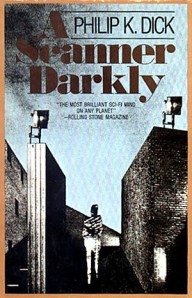 (1977). This is not going to be a properly scholarly review. I did not take notes as I was reading, so there will be no quotes, no passages mentioned en specific, and, indeed, no merit whatsoever. I’ve been suspicious of Philip K. Dick. He’s very hip. Namechecked, by lanky, waifish indie rock oafs (because when I namecheck of Jane Austen and the Damned it is soooooo much cooler. Everyone, by which I include myself and my friends, is an asshole). I’d read and enjoyed Eye in the Sky a few years ago. I started/got bored by The Man in the High Castle a year after that. So, having 2 strikes and 1 ball, I went to ASD expecting nothing would impress me. I was expecting to be unimpressed. Being expectations, my expectations were fulfilled. I took every opportunity to question PKD’s reputation as a post-modernist.
(1977). This is not going to be a properly scholarly review. I did not take notes as I was reading, so there will be no quotes, no passages mentioned en specific, and, indeed, no merit whatsoever. I’ve been suspicious of Philip K. Dick. He’s very hip. Namechecked, by lanky, waifish indie rock oafs (because when I namecheck of Jane Austen and the Damned it is soooooo much cooler. Everyone, by which I include myself and my friends, is an asshole). I’d read and enjoyed Eye in the Sky a few years ago. I started/got bored by The Man in the High Castle a year after that. So, having 2 strikes and 1 ball, I went to ASD expecting nothing would impress me. I was expecting to be unimpressed. Being expectations, my expectations were fulfilled. I took every opportunity to question PKD’s reputation as a post-modernist.
The conventional progression and structure of the narrative was my first gripe. Dick doesn’t unsettle time, structure, or style in ways at all comparable to people like Gass and Acker or even old school folks like Beckett and Stein. Indeed, this book made a good movie. The reader can understand what’s going on without much effort, and when s/he can’t the un-understanding comes from twists of content rather than ruptures of form. Dick adds some scientific passages which “disrupt” the narrative in a few points, but it’s clunky. Plus, they’re so related to the events at hand (some theory about left/right brain function during Fred/Arctor’s psychological examination) that it isn’t really a disruption. His notion of identity is equally conventional. A basic binary, Fred/Arctor says “who am I, really?” or something very close to that more than once. If he really wanted to be all post-mod, he’d cut out all that “really” nonsense. These were my thoughts for the first 200 pages.
I started talking to my roommate about the book. He’s a big fan of K. Dick, and has read much more of his oeuvre than I. We didn’t argue about the merits of this book. I just started saying how I was disappointed in its lack of experimentation. I don’t remember exactly what he said, but right after those words were coming out of my mouth I started feeling like an asshole, one of those “gotcha” journalists Sarah Palin always talks about. I was using my personal experience simply to belittle, allowing Dick inadequate space to say what he worked so hard to say. On finishing the book, I still don’t agree with anyone who calls him postmodern, which matters because the notion is so strictly defined. Everyone knows postmodern the minute the see it. But A Scanner Darkly is very beautiful and sad. It does what good art should do. I care about the characters. The way Dick explains the sadness he’s trying to convey–the contentstructure–is original and interesting. The sadness is real sadness. Fred and his friends stuggle with addiction, loss, loneliness, boredom, and mistrust.
Doing something you can’t undo. Making final decisions that don’t seem so dire when they’re made. Addiction, loss, loneliness, boredom, and mistrust; I feel these a lot.
So what did I learn today? Learn how to put what you’ve learned behind you. Knowing things is nice but it’s important to know when and not to use it. Some things don’t need your opinion. Some of your opinions don’t concern the things you think they concern. A well-kept conceptual apparatus is a perilous kit. When you don’t know this, you’re going to miss out on a lot. Use your personal experience to embiggen. Keep your ideas in the air. Always challenge what you think you know because you might have to relearn a bunch which glares with obvious. And that’s why you always leave a note.
